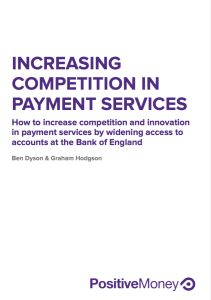Increasing Competition in Payment Services (Report)


Since the crisis the government has been keen to encourage more competition between banks. Their main focus has been making it easier for people to switch their current account between different banks. But we think this misses a bigger opportunity: there is much more potential for competition from technology firms and mobile app developers, who could develop current/checking accounts and more user-friendly ways of handling your money and payments.
Unfortunately, any tech firm that currently tries to compete with the banks will find that the existing regulation actually protects the position of the large banks and makes it almost impossible for new firms to compete.
We wrote the following briefing to explain the changes that the Financial Conduct Authority, Payment Services Regulator and Competition and Markets Authority need to enforce in order to allow tech firms to compete with the big banks. We submitted it to the Competition and Market Authority’s review of competition in current accounts, had a constructive meeting with two of the officials there, and hope to discuss it with them again in the next stage of their review.
DOWNLOAD Increasing Competition in Payment Services
One advantage of allowing more non-bank firms, such as tech firms, to get involved in providing current accounts and payment services, is that it would reduce the importance of banks. Currently they provide both the payments system and the main source of lending to the economy. Their lending business is now facing competition from the peer to peer and crowdfunding industry, but the payments business is still protected by a number of regulator and industry barriers. Allowing tech firms to compete away some of the bank’s payment services would mean that banks could no longer claim to have a uniquely essential role in the economy. We could then start to treat them like any other business.
OVERVIEW
UK banks earn over £8 billion each year from providing personal current accounts (PCAs) and a further £2 billion each year from business current accounts (BCA). But the government’s Competition & Markets Authority has declared that that the sector “lacks effective competition and does not meet the needs of personal consumers or small and medium sized enterprises”.
The current account sector should be ripe for competition. Payments and current accounts are fundamentally a technology business, and so we should expect to see the same levels of competition as happens in the mobile phone or broadband industry (for example).
However, there are huge and unnecessary barriers to entry to this market, which means that the UK’s large incumbent banks are protected from competition from potentially more nimble and innovative tech firms. This works to the detriment to consumers, but to the advantage of incumbent banks.
We believe that responsibility and blame for these barriers to entry lie ultimately with the Bank of England. The Bank of England refuses to provide accounts (‘settlement accounts’) to entities that are not regulated as banks (‘authorised credit institutions’). This means that only banks and building societies have the ability to store electronic money at the Bank of England; all other firms must make do with accounts at the larger banks. The Bank of England therefore denies new entrants direct access to its services in a way that benefits the incumbent banks (as explained in more detail below).
The Bank of England could open the payments industry to competition from technology firms with no risk to financial stability, if the recommendations in this paper were followed.
STRUCTURE OF THIS BRIEFING
We start by explaining how the best chance of improving competition in the PCA/BCA space is to open the industry up to competition from firms that only provide payments services (payments-only providers). These firms are most likely to come from the tech industry, rather than from the financial services sector.
We explain how payments-only providers are currently required to fit into the regulations for ‘Payment Institutions’ (PIs) or ‘Electronic money issuers’ (EMIs) even though this regulation preserves some significant barriers to entry that make it impossible for such firms to have a credible chance of competing with the incumbent banks. We list the barriers to entry that result from the legislation, and make recommendations on how the Bank of England could remove these barriers to entry.